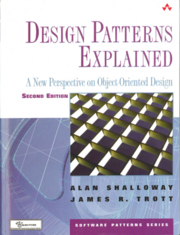Shalloway and Trott 2002
From CSSEMediaWiki
(Difference between revisions)
(New page: '''Title:''' Design Patterns Explained: A New Perspective on Object-Oriented Design '''Author:''' Alan Shalloway, James R. Trott '''Year:''' 2005 '''Publisher:''' Pearson Education, Inc...) |
|||
| Line 1: | Line 1: | ||
| + | [[Image:Design_patterns_shalloway_trott.png|thumb|left]] | ||
| + | |||
'''Title:''' Design Patterns Explained: A New Perspective on Object-Oriented Design | '''Title:''' Design Patterns Explained: A New Perspective on Object-Oriented Design | ||
| Line 8: | Line 10: | ||
'''Note:''' Second Edition | '''Note:''' Second Edition | ||
| + | |||
== Quote About the Text == | == Quote About the Text == | ||
''"One of the great things about the book is the way the authors explain concepts very simply using analogies rather than programming examples -this has been very inspiring for a product I'm working on: an audio-only introduction to OOP and software development."'' - Bruce Eckel | ''"One of the great things about the book is the way the authors explain concepts very simply using analogies rather than programming examples -this has been very inspiring for a product I'm working on: an audio-only introduction to OOP and software development."'' - Bruce Eckel | ||
| + | |||
| + | |||
| + | |||
== Summary == | == Summary == | ||
Revision as of 23:03, 19 October 2010
Title: Design Patterns Explained: A New Perspective on Object-Oriented Design
Author: Alan Shalloway, James R. Trott
Year: 2005
Publisher: Pearson Education, Inc.
Note: Second Edition
Quote About the Text
"One of the great things about the book is the way the authors explain concepts very simply using analogies rather than programming examples -this has been very inspiring for a product I'm working on: an audio-only introduction to OOP and software development." - Bruce Eckel
Summary
- Better ways to start "thinking in patterns"
- How design patterns can facilitate agile development using eXtreme Progmramming and other methods
- How to use commonality and variability analysis to design application architectures
- The key role of testing into a patterns-driven development process
- How to use factories to instantiate and manage objects more efficiently
- The Object-Pool Pattern - a new pattern not identified by the "Gang of Four"
- New study/practice questions at the end of every chapter
